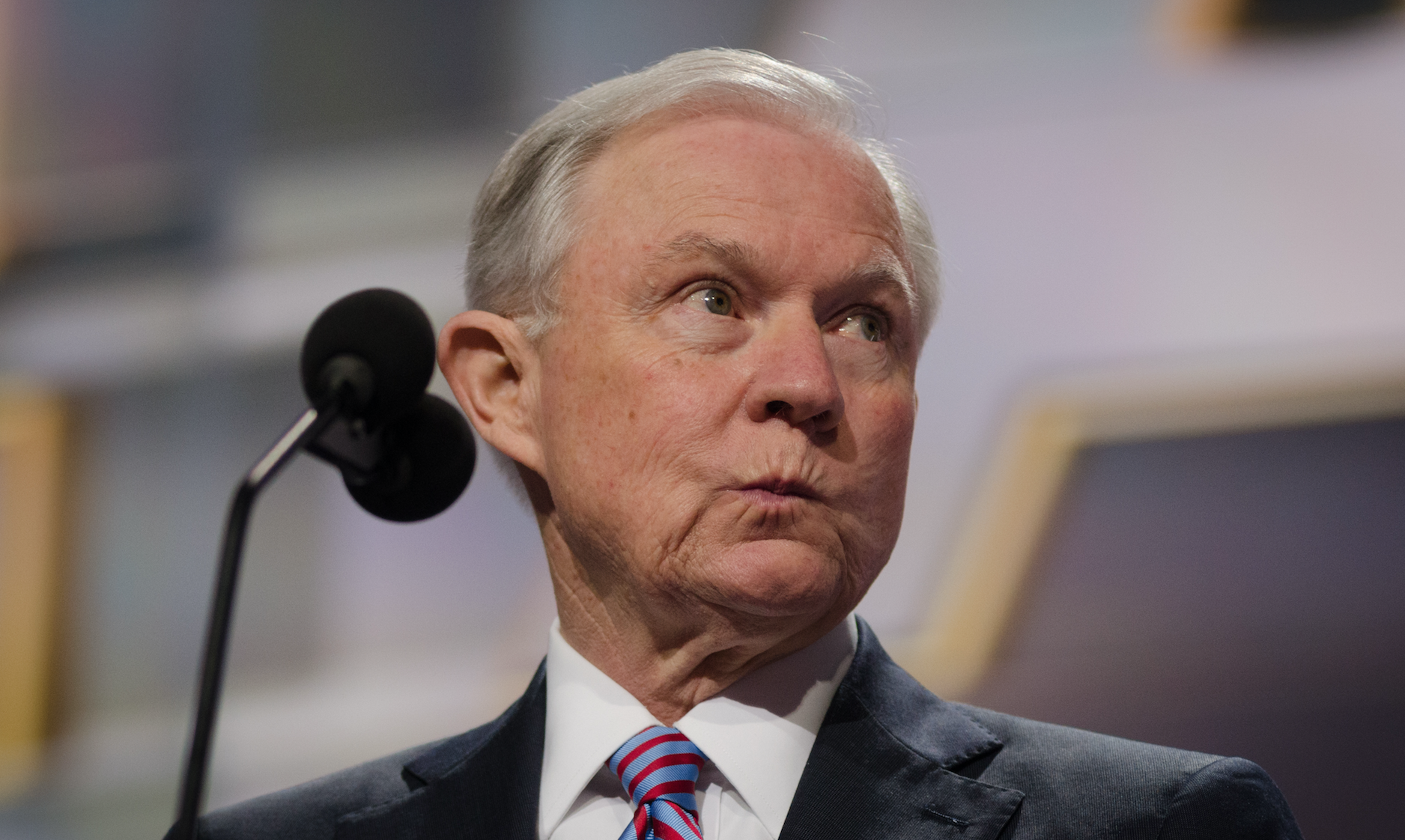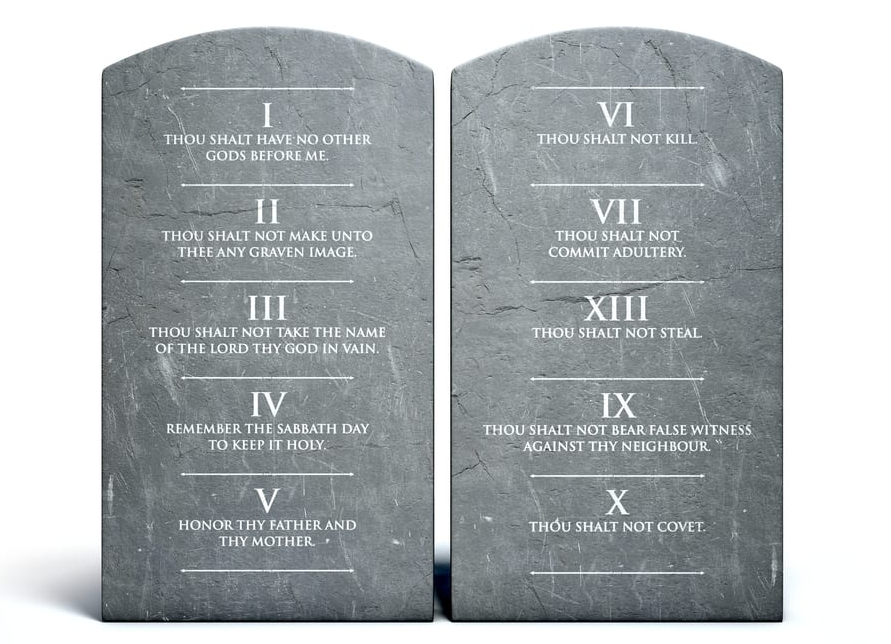Mobile Menu

Lauryn Seering
Massachusetts school district to stand up for secularism (September 5, 2018)
Georgia school won’t post prayer walk on Facebook (September 24, 2018)
Tennessee public utility won’t endorse religion (September 21, 2018)
Religious speeches not part of graduation (October 1, 2018)
Cross to be removed from city property in Iowa (September 25, 2018)
N.J. school removes event from Facebook (September 25, 2018)
School reminded it can’t allow Gideons in class (September 28, 2018)
Kansas school takes down bible verse (October 1, 2018)
Religious testimony at football camp is not OK (October 2, 2018)
Religious quote on sign taken down in Florida (October 3, 2018)
Secular alternative replaces religious picture (October 5, 2018)
No more faculty praying at flagpole (October 9, 2018)
‘God bless’ sign taken down in New York (October 10, 2018)
FFRF corrects barrage of misstatements in Jeff Sessions speech to Federalist Society

On Monday, Oct. 29, Attorney General Jeff Sessions spoke to a Boston chapter of the Federalist Society about his haunting vision for religious liberty. In an attempt to sell a story of Christian persecution and demonize the nonreligious, Sessions made several false or deeply misleading statements, including on the Freedom From Religion Foundation itself. FFRF offers the following rebuttal to Sessions’ most egregiously incorrect claims.
First and foremost, Sessions repeated a Kellyanne Conway lie, stating that the recent synagogue shooting in Pittsburgh “was not just an attack on the Jewish faith. It was an attack on all people of faith. And it was an attack on America’s values of protecting those of faith.” The shooter was anti-Semitic, not anti-religious. He appears to be a Christian, quoting the New Testament to justify his anti-Semitism.
Sessions and Conway are attempting to blame the crimes of their Christian nationalist supporters on the secular community, which is actually more committed to rooting out Christian nationalism (and by extension, white nationalism) than anyone else.
Sessions doubled down on this deception, transitioning into attacks on the Freedom From Religion Foundation and other groups that work to uphold the constitutional separation between state and church. Sessions grossly mischaracterized a recent FFRF court victory where a federal district court struck down a tax statute that allows “ministers of the gospel” to exclude (and therefore not pay taxes on) income their church earmarks for housing. The bigger the house — think of Joel Osteen’s mansion — the bigger the tax break, and all because the person is religious. Sessions characterized this discriminatory and lucrative ($700 million a year) tax break as the court deciding that “not forcing religion to pay the government somehow means the government is establishing a religion.”
Sessions also mischaracterized other recent cases involving his dystopian view of religious liberty. One such case was Masterpiece Cakeshop, in which a bakery requested a license to refuse to serve wedding cakes to same-sex couples because the discrimination is based on religion. While the U.S. Supreme Court did not tackle the central question of the case, Sessions distorted the issue by saying the baker “so bravely” faced an ordeal because he “simply doesn’t want the government to force him to create art that offends his religious beliefs.”
Sessions knows his audience; The Federalist Society provides President Trump with federal judicial nominees who join Sessions in twisting facts of every case to paint the religious party — usually socially conservative white Christians — as a persecuted victim, even when the case involves other parties who have actually suffered harm. Sessions openly admitted that “thanks to President Donald Trump, there are two more Federalist Society members sitting on the Supreme Court.”
Sessions’ speech also included misleading statements about the Declaration of Independence, the Religious Freedom Restoration Act (RFRA), and more. He even betrayed his own bible by proclaiming that “free exercise means a right to reasonably act, not just meditate in secret,” when the New Testament commands that “When you pray, do not be like the hypocrites, for they love to pray standing in the synagogues and on the street corners to be seen by others. . . . But when you pray, go into your room, close the door and prayer to your Father, who is unseen.” Matt. 6:5–6.
FFRF is committed to working to educate all Americans on the true meaning of religious liberty, as understood by the nation’s Founders, so that they can see speeches like Sessions’ for the bundle of lies and misstatements that they are.
“Sessions and the Federalist Society can’t come right out and say what they are really fighting for: Christian nationalism,” commented FFRF Co-President Dan Barker. “So they have to falsely claim that it’s a matter of religious liberty. This is an old trick that dates back to 19th-century debates over slavery, and it should be soundly rejected.”
The Freedom From Religion Foundation is a national nonprofit organization with more than 32,000 members across the country, including in every state. FFRF’s purposes are to protect the constitutional principle of separation between church and state, and to educate the public on matters relating to nontheism.
Shutterstock photo Taidgh Barron
Statement by Andrew L Seidel,
Director of Strategic Response
For the Freedom From Religion Foundation

The god of the Bible is on the Nov. 6 ballot in Alabama. A proposed constitutional amendment would allow the government to display his so-called divine law — the Ten Commandments — on every piece of public property in the state.
Amendment 1 unnecessarily rewrites the religious liberty provisions of the Alabama Constitution in alarming ways. There’s actually some good language in the amendment — for instance, prohibiting taxes from going to churches — but that’s already protected under the law, so there’s no need for a change.
This amendment is not meant to protect religious liberty or ensure that the state doesn’t meddle in the administration of churches. It is meant to decorate every piece of government property, especially in public schools, with a biblical law that begins, “I am the Lord your God… You shall have no other gods before me.”
That divine command, while central to Judeo-Christianity, is, to be blunt, un-American. The First Commandment embodies principles that directly conflict with the principles on which the United States was founded. No law can tell an American to worship a god, let alone which god. Americans are free to be godless (and a growing number are), or, if they wish, to worship every god from every holy book.
The commandments continue in this un-American vein, prohibiting free expression and art (graven images), prohibiting free speech (taking the Lord’s name in vain), and sanctioning slavery — twice (Exodus 20:10, 20:17). The Ten Commandments even promise to punish innocent children, “to the third and fourth generation,” if parents are brazen enough to exercise the religious freedom guaranteed in the First Amendment of the U.S. Constitution. The Tenth Commandment is perhaps the worst: condoning slavery, treating women as chattel, and criminalizing thought.
Sure, some of the Ten Commandments overlap with criminal laws that prohibit murder, theft, and perjury. But these rules are not exclusive or original to Judeo-Christianity. They are universal principles that all humans understand.
If this amendment passes, it won’t be stars falling on Alabama, but lawsuits.
Roy Moore has taught us at least one thing: State law does not trump federal law. Whatever the Alabama Constitution or Alabama judges say, the U.S. Constitution still prohibits using the machinery of the state to promote one religion over another, or religion over nonreligion. In other words, Alabama law may say that displaying the Decalogue is okay, but U.S. law still says it’s not, and the U.S. Constitution is “the supreme law of the land.”
Roy Moore learned this the hard way — twice.
This basic principle also undercuts Amendment 1’s economic safeguard: prohibiting the use of state funds to defend the monument. But of course this amendment is going to cost Alabama taxpayers. State funds may not be used to defend such monuments, but when the state loses those lawsuits (it’s not a question of if), the state is going to have to pay out attorneys’ fees to the other side. (This is a fairly common trick that conservative Christian legal firms play on the taxpayers, but the taxpayers shoulder all the risk; the firms reap any reward.)
You have a choice, Alabamians: Amendment 1 or the First Amendment?
If you think your government should be in the business of promoting one god over others, imagine how you might feel if it were not the God of the Bible, but the God of the Quran that were displayed everywhere. (Notably, the drafters of this amendment rejected language that would also have permitted “other religious displays that express their faith or religious beliefs.”)
And if the idea of verses of the Quran in public schools doesn’t bother you, then listen to Jesus’ Sermon on the Mount. Jesus condemned public piety, those who practice their religion “on the street corners to be seen by others,” as hypocrisy. Nothing could be more public or hypocritical than slapping monuments full of un-American principles all over public property.
Do the right thing, Alabama. Vote NO on Amendment 1.